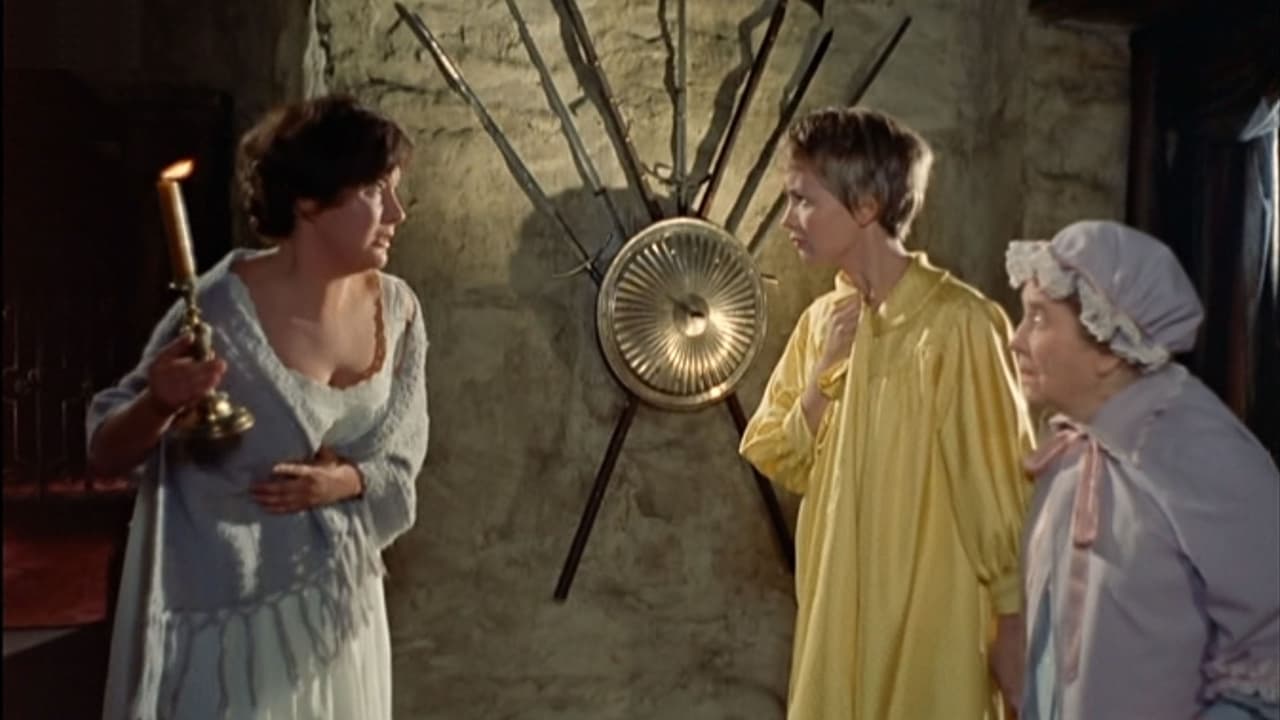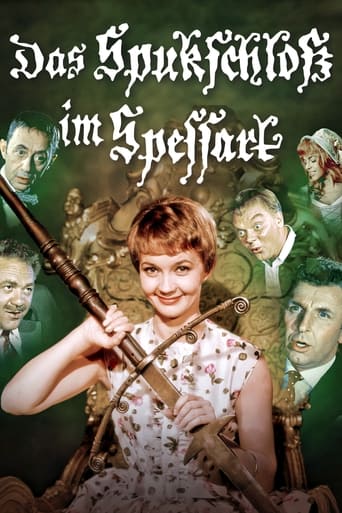



everything you have heard about this movie is true.
View MoreThe movie turns out to be a little better than the average. Starting from a romantic formula often seen in the cinema, it ends in the most predictable (and somewhat bland) way.
View MoreThere is, somehow, an interesting story here, as well as some good acting. There are also some good scenes
View MoreActress is magnificent and exudes a hypnotic screen presence in this affecting drama.
View MorePerhaps one needed to have grown up with this type of film and, yes, "Spukschloss im Spessart" (Simplified English title: "The Haunted Castle") will appear very dated to a contemporary audience, but for many Germans the mere mention of the "Spessart"-movies will trigger soothing childhood-memories.During the 1950s, 60s and 70s German cinema has produced countless "family-friendly" comedies and musical, which did more than just a little borrowing from contemporary American films. Like the US-versions, these films were squeaky-clean, made the viewers forget the still fresh horrors of the second World War for an hour and a half, and where the "Ozzie and Harriet"-cinema of the US had their Bob Hopes, Doris Days and Rock Hudsons, the German variations had their Liselotte Pulvers and Heinz Baumanns.The story is as simple as it is clean-cut: A group of ghosts that have been walled up in the cellar of the Spessart-Inn during the middle-ages retain their freedom, when the Inn is replaced by the Autobahn. However, they can only find peace if they do one good deed. So they try to help out the beautiful but broke Countess Charlotte (Pulver), whose castle is in danger of being turned into a modern hotel. Needless to say, that the bumbling ghosts at first fail and have to deal with corrupt politicians (Hubert von Meyerinck) and a crazed prince from the middle-east (Hans Clarin). Needless to say: It all ends good & well (and the Americans are 'borrowing' the spirits in order to beat the Russians at the space-race).And since the entire film interludes with numerous song- & dance-numbers, the producers have seen it fit to call "Spukschloss im Spessart" a "spookical" (German: "Grusical"), making it one of the commercially successful German films of this season. The only major difference to the general US-American variation might be, that the German comedies were a tidbit more critical, for example parodying then-capital-city of Bonn, politics and German bureaucracy.Of course, the special-effects are dated (to put it mildly; today most digital student-projects would have more convincing effect), but one cannot deny that the individual songs – despite being kitschy, occasionally put a hook to the ear. Baumann as the countess' love-interest is a little bland, Pulver cute as ever (having the same tom-boyish air of a young Doris Day and Hans Clarin steals every scene he's in with his over-the-top, manic performance.I'm not going to write about all the goodness of the film – from me it gets a solid 7.5 and I never give 10 – but rather focus on what I view as little weaknesses.
View MoreThis sequel to Wirtshaus im Spessart is a slightly weaker effort that, at times, feels like a saccharine Disney production from that time period, particularly with regard to the hammy performances by the ghosts.However, the film is redeemed by the ever-delightful Liselotte Pulver's talent for light comedy.Set two hundred years after the previous film, the wirsthaus has been demolished to make way for a petrol station, reflecting the speed of reconstruction and modernisation in 1950s West Germany. This unleashes the ghosts of the highwaymen from the first film who seek out the descendant of Liselotte's previous character in an effort to redeem themselves.Whilst the humour is, on the surface, largely slapstick, there is much commentary and satire on the state of German politics as well.The film is fast-paced and suitably light-hearted with some delightful musical numbers. Indeed, even the opening credits are sung.The special effects though, are distractingly bad and, like its predecessor, the lack of adventure in terms of scale, settings and cinematography really reflect the lack of confidence in German cinema at this time compared with during the Weimar Republic. Clearly the nation was reinventing itself after the horrors of the war and the self-deprecating humour and satire aimed at politicans and bureaucrats reflect the desperately-needed change in attitude towards leaders after the disaster of the Third Reich.However, for all of its lack of artistic spirit, this film reflects the reinvention of Germany as a modern democracy, able to laugh at itself, point honestly to its shortcomings and leave well and truly behind its former insularity and nationalistic temperament. Thus, it is a reflection of a much more positive and mature people who are just starting to find a new place for themselves as co-leaders in a modernising Europe.
View Morebasically a sequel to "Das Wirtshaus I'm Spessart" based on the popular German fairy tale/legend, which came to the big screen 2 years earlier, this movie stars nearly all of Germany's comedians of that time. At first a mixture of comedy and musical, it is also pretty political and aims mostly for post-war short-comings after the German "Wirtschaftswunder", like pensions still paid to former "Wehrmacht"-Officers, but makes fun also of celebrities of that time like the liaison of Onassis and Maria Callas, just to name one. The story is about the ghosts of the robbers from "Wirtshaus I'm Spessart" and how they redeem themselves. As a punishment for their crimes they were locked up in the basement of the "Wirtshaus" (pub) to starve to death, accompanied by a curse that they should rot there as long the walls would be standing. The wall falls when the old pub has to make room for a gas-station and a new motel next to the brand new freeway and the souls of the robbers are freed. Now ghosts they come to the conclusion that they have to do something good, so be released. So they decide to search for the Castle of the Comte, they blackmailed in the first Movie and who resided over the Woods they were thieving in.They find it to be inherited by the last Comtess, played by Lieselotte Pulver, who has no money at all, because her late father lost all the family fortune.(to be continued)
View MoreThis sequel takes place several hundred years after the original movie "Wirthaus im Spessart". The robbers have long been caught and sentenced to death and killed, now their ghosts have returned to the castle of the contessa who once befriended their leader. There, they find her grand-grand-grand..... daughter, and decide to help her out to pay for their sins in their lives.Once again it is a romantic comedy, this time with a few ghost sidekicks thrown in, and lots of slapstick humour that kids like. My favourite part has to be the musical number "Woll'n wir doch mal sehn ob's nicht Gespenster gibt in Bonn" - hillarious!However, I'm not sure how much it would appeal to adults.
View More